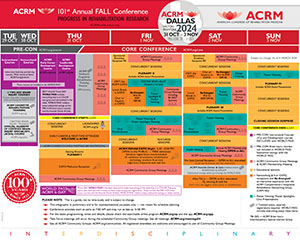.jpg)
Sonya Kim, PhD, CRC, BCB, FACRM
Research Associate Professor and Research Scientist
NYU Grossman School of Medicine
NY, New York, United States
Sonya Kim, PhD, CRC, BCB, FACRM, is a research associate professor at the New York University Grossman School of Medicine, where she holds a joint appointment in the department of Neurology and the department of Rehabilitation Medicine. Dr. Kim is a clinical psychologist, a certified rehabilitation counselor, and is board-certified in biofeedback. In 2011 she was awarded her PhD in Clinical Psychology, with a health emphasis, from the APA-accredited Yeshiva University Ferkauf School of Psychology. Her research has the overarching focus of contributing to evidence-based practice for the rehabilitation of persons with neurological disorders and for the research-informed support of their caregivers. More precisely, and with the ultimate goal of improving societal participation of people with disability, Dr. Kim has examined the ways in which patients’ perspectives and beliefs, as well as those of their caregiving families, can play an important role in shaping clinical treatment. She has served as PI in studies, funded by grants from the consortium of MS Centers and the National MS Society, that undertook the development of a personal-growth scale in partners of individuals with multiple sclerosis. She went on to serve as PI in a study which adapted this personal-growth instrument and validated it for use by family caregivers of individuals with acquired brain injury. The study was conducted in collaboration with the Brain Injury Association of America, and was funded by the National Institute on Disability, Independent Living, and Rehabilitation Research (NIDILRR) under the Switzer Research Fellowship. She serves as the founding Chair of the Complementary Integrative Rehabilitation Medicine Networking Group. Dr. Kim is a psychologist with a disability, and her personal experience of staying active in her community has significantly informed her professional life and her vision of what disability inclusion means—as well as the work that needs to be done to ensure people with disability feel included. She draws on Dembo et al.'s (1975) statement, “Change is greatly dependent on the willingness of the nonhandicapped to institute change,” to fuel her efforts to build systems and momentum to increase disability inclusion.
Disclosure(s): No financial relationships to disclose
Presentation(s):
-
Thursday, October 31, 2024
7:30 AM - 2:30 PM -
Friday, November 1, 2024
8:15 AM - 9:15 AM -
Friday, November 1, 2024
12:15 PM - 12:45 PM -
Archives Information/education Pages: What They Are, How to Write Them, How to Review Them 0562
Friday, November 1, 2024
1:15 PM - 2:15 PM -
Disability Inclusion in Rehabilitation Sciences: An Insider’s Perspective 9651
Friday, November 1, 2024
1:15 PM - 2:15 PM -
Complementary Integrative Rehabilitation Medicine Networking Group
Saturday, November 2, 2024
2:45 PM - 3:45 PM -
Saturday, November 2, 2024
4:00 PM - 5:00 PM

.jpg)
.jpg)
.jpg)
